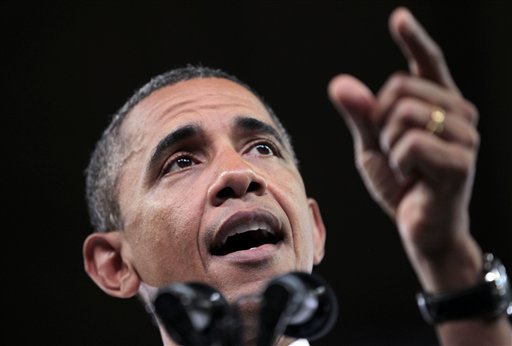WASHINGTON - President Barack Obama's proposal to reduce long-term deficits with $1.5 trillion in new taxes is less an opening bid in a negotiation than it is an opening salvo in a struggle to draw sharp contrasts with congressional Republicans.
Obama's proposal is aimed predominantly at the wealthy and comes just days after House Speaker John Boehner ruled out tax increases to lower deficits. It also comes amid a clamor in his own Democratic Party for Obama to take a tougher stance against Republicans. And while the plan stands little chance of passing Congress, its populist pitch is one that the White House believes the public can support.
The core of the president's plan totals just more than $2 trillion in deficit reduction over 10 years. It combines the new taxes with $580 billion in cuts to mandatory benefit programs, including $248 billion from Medicare.
The administration also counts savings of $1 trillion over 10 years from the withdrawal of troops from Iraq and Afghanistan.
The deficit reduction plan represents an economic bookend to the $447 billion in tax cuts and new public works spending that Obama has proposed as a short-term measure to stimulate the economy and create jobs. He's submitting his deficit fighting plan to a special joint committee of Congress that is charged with recommending deficit reductions of up to $1.5 trillion over 10 years.
In a defiant note, administration officials made clear Sunday that Obama would veto any Medicare benefit cuts that aren't paired with tax increases on upper-income people.
Officials cast Obama's plan as his vision for deficit reduction, and distinguished it from the negotiations he had with Boehner in July as Obama sought to avoid a government default.
As a result, it includes no changes in Social Security and no increase in the Medicare eligibility age, which the president had been willing to accept this summer.
Moreover, the new tax revenue Obama is seeking is nearly double the $800 billion that Boehner had been willing to consider in July. Republicans were already lining up against the president's tax proposal before they even knew the magnitude of what he intended to recommend.
"Class warfare may make for really good politics but it makes for rotten economics," GOP Rep. Paul Ryan of Wisconsin, the House Budget Committee chairman, said Sunday in reaction to one Obama tax proposal to impose a minimum tax rate on wealthy filers.
Key features of Obama's plan, as described by senior administration officials Sunday evening:
-$1.5 trillion in new revenue, which would include about $800 billion realized over 10 years from repealing the Bush-era tax rates for couples making more than $250,000. It also would place limits on deductions for wealthy filers and end certain corporate loopholes and subsidies for oil and gas companies.
-$580 billion in cuts in mandatory benefit programs, including $248 billion in Medicare and $72 billion in Medicaid and other health programs. Other mandatory benefit programs include farm subsidies.
-$430 billion in savings from lower interest payment on the national debt.
By adding about $1 trillion in spending cuts already enacted by Congress and counting about $1 trillion in savings from the drawdown of military forces from Iraq and Afghanistan, the combined deficit reduction would total more than $4 trillion over 10 years, senior administration officials said.
Republicans have ridiculed the war savings as gimmicky, but House Republicans included them in their budget proposal this year and Boehner had agreed to count them as savings during debt ceiling negotiations with the president this summer.
Obama backed away from proposing sweeping changes to Medicare, following the advice of fellow Democrats that it would only give political cover to a privatization plan supported by House Republicans that turned to be unpopular with older Americans.
Administration officials said 90 percent of the $248 billion in 10-year Medicare cuts would be squeezed from service providers. The plan does shift some additional costs to beneficiaries, but those changes would not start until 2017.
Illustrating Obama's populist pitch on tax revenue, one proposal would set a minimum tax on taxpayers making $1 million or more in income. The measure - Obama is going to call it the "Buffett Rule" for billionaire investor Warren Buffett - is designed to prevent millionaires from taking advantage of lower tax rates on investment earnings than what middle-income taxpayers pay on their wages.
At issue is the difference between a taxpayer's tax bracket and the effective tax rate that taxpayer pays. Millionaires face a 35 percent tax bracket, while middle income filers fall in the 15 or 25 percent bracket. But investment income is taxed at 15 percent and Buffett has complained that he and other wealthy people have been "coddled long enough" and shouldn't be paying a smaller share of their income in federal taxes than middle-class taxpayers.

